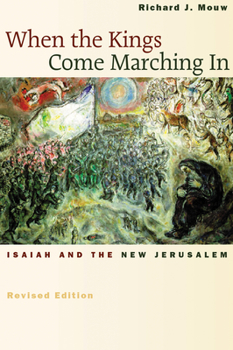When the Kings Come Marching in: Isaiah and the New Jerusalem
Select Format
Select Condition 
Book Overview
Widely respected for his perspectives on faith in the modern world, Richard J. Mouw has long stood at the forefront of the "Christ and culture" debate. In When the Kings Come Marching In -- here revised and updated -- Mouw explores the religious transformation of culture as it is powerfully pictured in Isaiah 60. In Isaiah 60 the prophet envisions the future transformation of the city of Jerusalem, a portrayal of the Holy City that...
Format:Paperback
Language:English
ISBN:0802839967
ISBN13:9780802839961
Release Date:May 2002
Publisher:William B. Eerdmans Publishing Company
Length:143 Pages
Weight:0.40 lbs.
Dimensions:0.4" x 5.3" x 8.0"
Customer Reviews
1 rating
How "When the Kings Come Marching In" informs our understanding of God's work in culture
Published by Thriftbooks.com User , 15 years ago
Richard Mouw's reading of Isaiah 60 in "When the Kings Come Marching In" is a very readable volume that offers valuable insights to the enduring problem of the relationship between Christianity and culture. We may discern three essential ways by which it informs our understanding of God's work in culture both now and in the future. It reminds us, firstly, of the scope of God's redemption: that it is broad and all-encompassing. Against pietistic, spiritualistic views that "only things with `souls'" matter in salvation - views better seen as "incomplete" rather than blatantly "false" - Mouw affirms God's care for the totality of human culture (21, 120). However sinful they might be, all the "languages, habits, ideas, beliefs, customs, social organizations, inherited artifacts, technical processes, and values" of human civilizations comprise "the fullness of the cosmos for which Christ died" (113). What Christ is reconciling to himself in the present and the future is nothing less than the Imago Dei itself, "parceled out" among and "collectively possessed" by all the peoples of the world (84). Secondly, "When the Kings Come Marching In" deepens our understanding of the restorative or reformative manner of God's redemptive work in culture. In light of the "cheap grace" that simplistic "Christ of Culture" positions may sometimes smack of, as a good Reformed theologian of culture Mouw wisely emphasizes both the "radicality of sin" presently pervading human relations and institutions, as well as on the judgment that pagan culture stands under as a result (68, 31). This judgment, however, is a "purifying," rather than "annihilating" one: what is destroyed are not the "ships of Tarshish" or the "cedars of Lebanon" per se, but their "former function" (29, 30). Once employed for idolatrous, rebellious, or vainglorious ends, "the wealth of the nations" is to be "cleansed" and "healed" through God's work both now and in the future, that they might be "freed for service to the Lord and his people" (32, 30). In this light, the book can help us develop a more holistic appreciation of Christ's tripartite role in culture: as source, judge, and healer (114). The third and perhaps most important thing we can learn concerns the provisional and even restrained nature of God's redemptive work in culture in the present, and how this informs the Christian's attitude towards participation in cultural activity. Though somewhat surprising given the cultural mandate theme underlying the book, two points that Mouw concludes with presented a challenge to my existing theology of culture (42). Firstly, even as the Christian community "ought to function as a model of, a pointer to, what life will be like in the Eternal City of God" as it "[shares] in "God's restless yearning for the renewal of the cosmos," Mouw takes care to stress that "there is no clear biblical command to Christians to `transform culture' in any general way" (93, 111, 129). Whatever cultural reform




